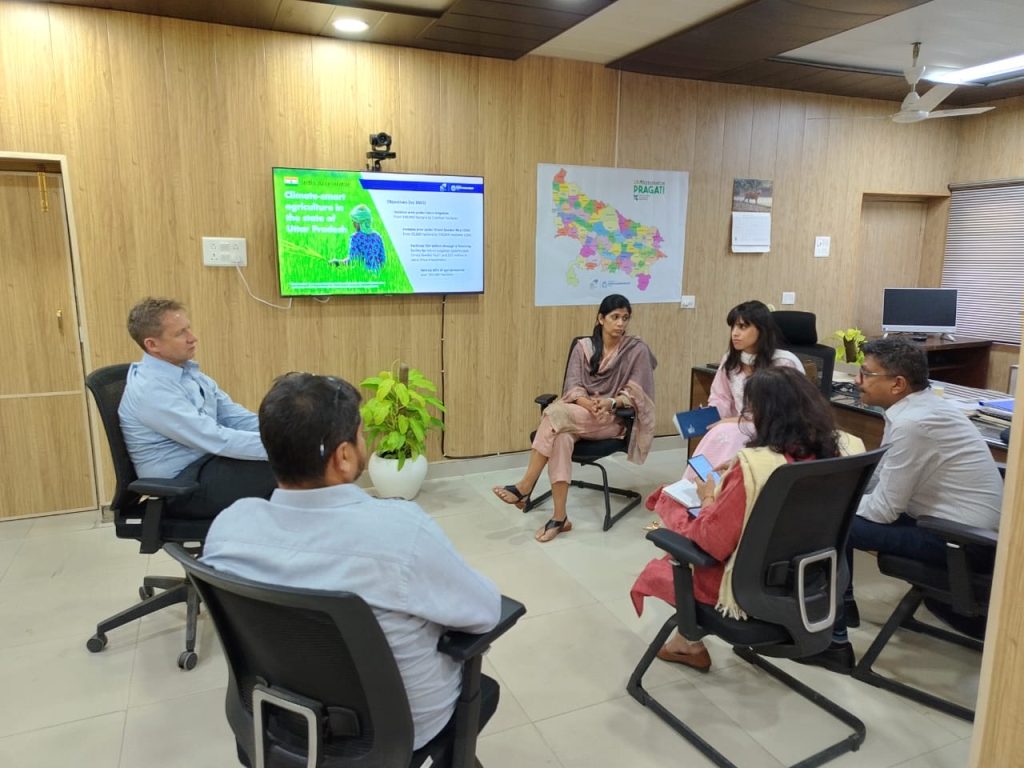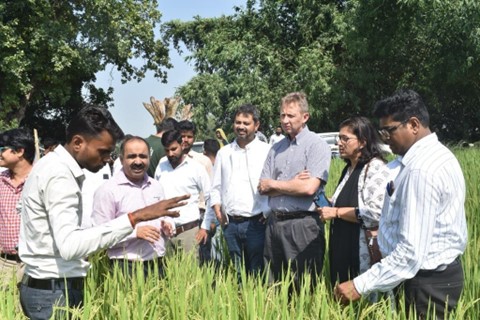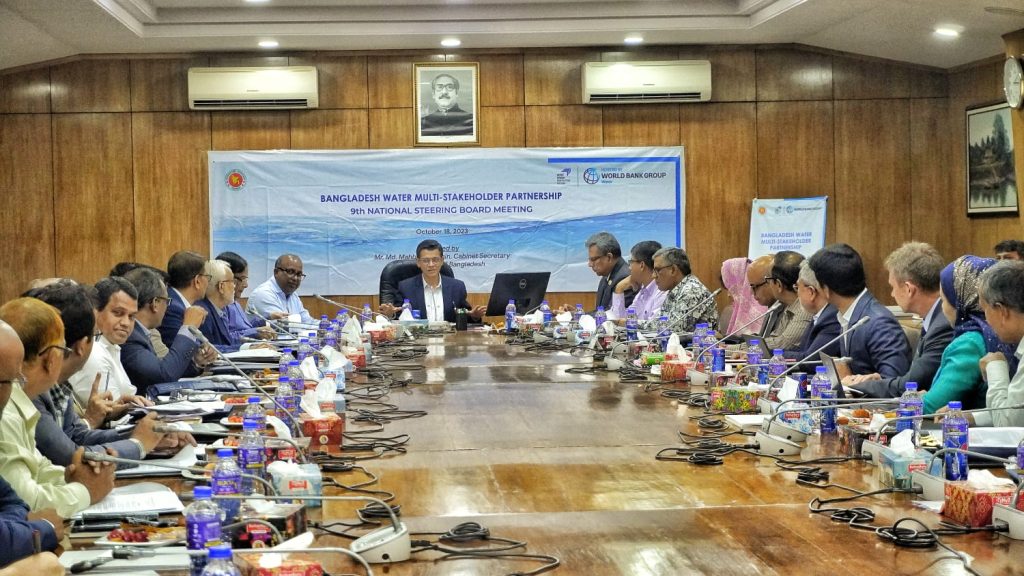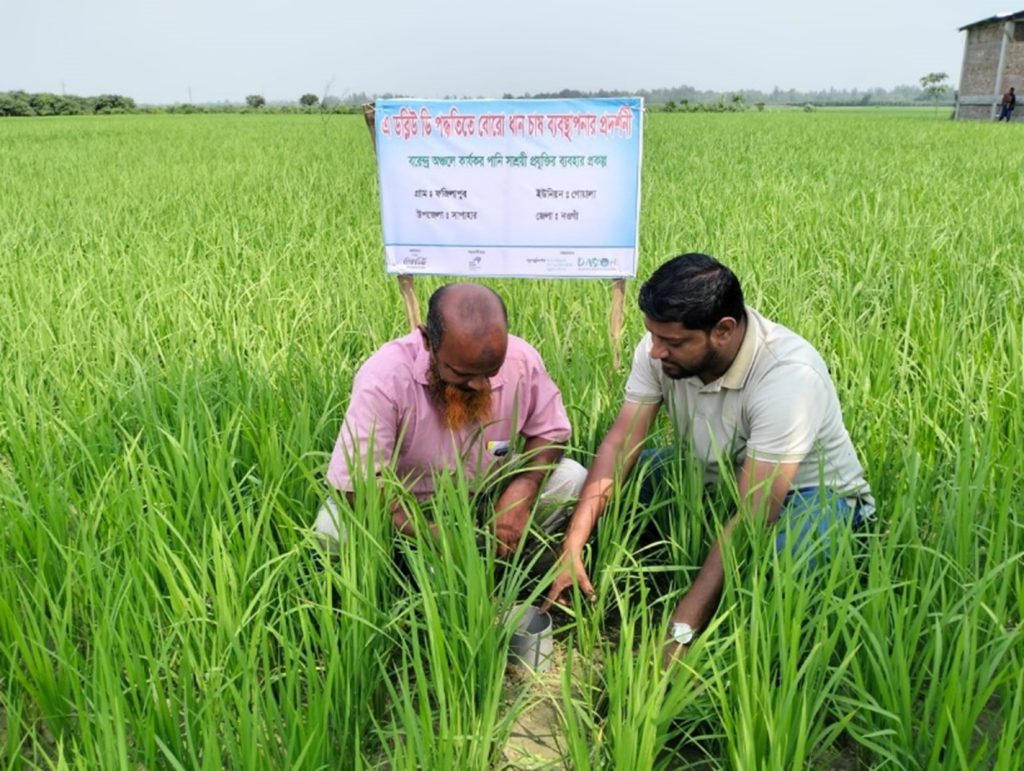2030 WRG in India and Bangladesh: Program Updates
The 2030 Water Resources Group (2030 WRG) has been working extensively with stakeholders in India and Bangladesh to unlock private sector innovations and financing, accelerate implementation at scale, and align World Bank operations to achieve water security. In October 2023, the 2030 WRG team visited India and Bangladesh to review progress, share insights, and collaborate with various stakeholder groups. Below is a roundup of project updates and insights from the programs in India and Bangladesh.
INDIA
In India, the 2030 WRG initiatives focus on enhancing water-use efficiency and mechanization in agriculture, promoting private sector mobilization, and supporting financial instruments for climate-smart water management practices. Highlights of program updates included:
- Scaling technology and financing innovations at PRAGATI (Program for Agricultural Transformation and Increased Incomes), an accelerator program in Uttar Pradesh (UP)
- Roundtable discussions with corporate partners in India
- Multi-stakeholder engagement on Wastewater Reuse Certification
PRAGATI

2030 WRG is actively working with the government of UP to increase private sector participation in transforming the food system, reducing carbon and water footprints, and adopting sustainable agricultural practices.
The UP accelerator program PRAGATI, was conceived by a Multi-Stakeholder Platform supported by 2030 WRG and the Bill & Melinda Gates Foundation (BMGF). The program is being led by the Agriculture Production Commissioner, Government of UP and aims to create a conducive space for the private sector to collaborate and leverage innovations and best practices in agri-water operations.
During the visit to India in October 2023, the 2030 WRG team identified opportunities to enhance the role of private sector organizations in the UP accelerator program to scale technology and financing innovations. During field visits in UP, the team also observed the success of innovative water management practices in rice paddies, such as the adoption of Direct Seeded Rice (DSR) technology, which holds promise for scalability, mechanization, and climate-smart practices.

Learn more about PRAGATI: https://blogs.worldbank.org/water/unlocking-agricultural-transformations-small-and-marginal-farmers-uttar-pradesh-india
Advancing private sector discussions
In line with 2030 WRG’s commitments and vision, the inclusion of the private sector in finding sustainable water solutions is critical in the case of India. During the October visit, roundtable discussions were held with corporate partners in India, including Coca-Cola, Microsoft, World Economic Forum, Millets for Health, and UPL, to review progress and identify future collaboration opportunities on water-use efficiency. There is a consensus to institutionalize an India-level Private Sector Partner Platform that will enable and facilitate private capital flows in water-use efficiency-related activities and program components. The proposed platform, as endorsed by the participants, is also expected to strengthen P2P (Private-to-Private) partnerships and amplify the impact of private sector financing and innovations in water in agriculture.
Wastewater Reuse Certification
Water Reuse Certificates (WRCs) are an innovative cap-and-trade policy instrument developed by Maharashtra Water Resources Regulatory Authority (MWRRA) in partnership with 2030 WRG. WRCs incentivize users, such as urban local bodies, private sector players, and industries, to comply with the government’s wastewater reuse policy.
During the visit to Mumbai in October 2023, 2030 WRG and MWRRA co-hosted a roundtable attended by several city Municipal Commissioners from Maharashtra, civil engineers, experts, and key private sector technology companies. The roundtable discussion was a step forward in 2030 WRG’s partnership and commitment to assisting the Government of Maharashtra in implementing the WRC program as an important tool to improve water security and water-use efficiency. The discussion also shed light on 2030 WRG and GIZ India’s partnership with the Ministry of Textiles to promote industrial water-use efficiency and sustainability through the application of WRCs in select textile clusters. The deliberations provided a comprehensive understanding of the status of WRCs, identified synergies, and laid the foundation for future collaborations in the areas of mutual interest.
Learn more about WRCs: Wastewater reuse certificates as tradable permits: a handbook for roll-out
BANGLADESH
In Bangladesh, 2030 WRG has been working to address water pollution management, promoting multi-stakeholder partnerships, and mobilizing private sector capital for climate-smart water management practices. Highlights of program updates included:
- Strengthening the way forward for Bangladesh Water Multi-Stakeholder Partnership (BWMSP)
- Connectivity consolidation with corporate stakeholders
- Farmer-led Climate-smart Agriculture in drought-prone Barind
Strengthening the way forward for Bangladesh Water Multi-Stakeholder Partnership (BWMSP)

2030 WRG acts as the Secretariat to the BWMSP, a quasi-legal entity that focuses on improving water resources management in the industrial, municipal, and agricultural sectors. The Partnership has representation from 50+ public-private-civil society-academia stakeholders at the national level. During the recent mission to Bangladesh in October 2023, a series of high-level meetings was conducted by 2030 WRG with relevant stakeholders in the public sector and private partners to understand their interests, engagement status, and the way forward. These meetings aimed to strengthen collaboration and identify strategic interventions to tackle water challenges in Bangladesh. The 9th Meeting of the National Steering Board (NSB), chaired by Cabinet Secretary, Government of Bangladesh (GoB) was also convened by 2030 WRG to drive collective actions catalyzing transformation toward improved water management in Bangladesh. The NSB made clear cross-sectoral directives on the acceleration of water pollution management and agricultural efficiency enhancement agenda leveraging private investment capital mobilization using innovative financing instruments.
Connectivity consolidation with corporate stakeholders

A half-day round table dialogue on public-private partnership development across industrial-municipal-agribusiness sectors in Bangladesh was organized with participation from Bangladesh Economic Zones Authority, Gazipur City Corporation, Local Government Division, Department of Bangladesh Haor and Wetlands Development, Water Resources Planning Organization (WARPO), Metropolitan Chamber of Commerce and Industries, Unilever, The Coca-Cola Company, Nestle, Global Development Incubator, H&M, DBL Group, International Finance Corporation (IFC), Embassy of the Kingdom of the Netherlands in Bangladesh (EKN), HSBC Bank, Bangladesh Bank, BRAC, Syngenta Foundation, ACI Agribusiness Limited, and the World Bank Water GP. The discussion focused on business cases for private sector investment in wastewater management and highlighted the paradigm shift from philanthropic to commercial investment. Partners are prepared for private capital mobilization in wastewater management, and the wastewater management service revenue stream will need to be strengthened to bring private sector participation at scale.

During the recent mission, a field visit was also conducted to see a pilot intervention on a PPP-based municipal wastewater treatment plant in Gazipur City Corporation developed by 2030 WRG. Currently, the 18MLD STP system is serving 20,000 households and has demonstrated a PPP model as a solution for Municipal Wastewater Management. The scale-up of this technical and financing mechanism has been adopted by the city corporation and is receiving support from 2030 WRG.
Farmer-led climate-smart agriculture in drought-prone Barind

2030 WRG has been leading the implementation of the Introducing Water-Efficient Technologies in Barind Tract project with support from The Coca-Cola Foundation. After successful completion of 5 years of impact-driven intervention covering over 194,000 beneficiaries intervening on 20,000 hectares of land with Laser Land Leveling and Alternate Wetting and Drying technology for rice paddy and ultra-high-density production using drip irrigation for mango-malta, IWET has managed to contribute toward rice productivity increase by 7%, and mango by 150-200%, saving over 16.7 million m3 of water. In addition to scaling water-efficient technologies for sustainable irrigation management, IWET has also been supporting private sector investment mobilization for enterprise development. At present, 60 Farmers’ hubs have been facilitating forward and backward linkages for key agricultural products and facilitating export market access for mango forward marketing.
